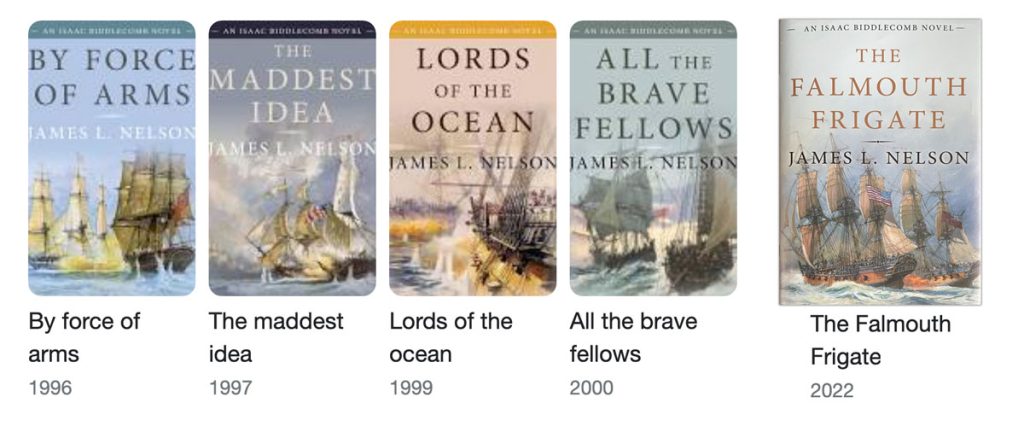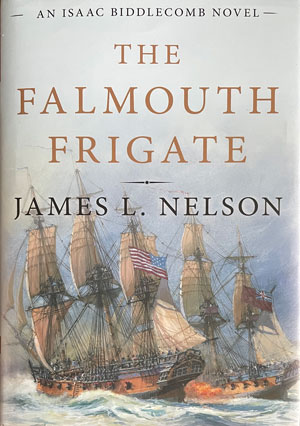In the mid-1990s, browsing in my favorite Newport store The Armchair Sailor, I discovered what I now call “the first Biddlecomb book” by James L. Nelson. By Force of Arms introduced Captain Isaac Biddlecomb (who was loosely based on John Paul Jones) as he dodged and tormented the British Navy around Narragansett Bay in the early years of the American Revolution. I quickly devoured the three sequels as they came out over the next four years, which were collectively known as “The Revolution at Sea series.”
In the decades since, I’ve devoured many of the other novels Nelson produced: a series about the Civil War; another about pirates; and a few stand-alone books, including one featuring Isaac Biddlecomb’s son. I’ve also gotten to know this wonderful author and human; when I finally admitted that his most popular and prolific Norseman Series (ten books and counting) didn’t appeal quite as much as the others, Nelson replied, “That’s because there’s almost no sailing—and a lot of fighting!” True dat. So I instantly added “honest self-assessment” to an already long list of authorly attributes.
20 years later
I was thrilled for both Nelson and his readers when McBooks Press republished the entire Biddlecomb series in 2021—and also had a private chuckle when I noticed the books had been rebranded as “Isaac Biddlecomb Novels.” Clearly characters are more memorable than battles. But I never expected to read a new one—until McBooks Press offered to send a review copy of The Falmouth Frigate, shortly after it came out in November 2022. As an author, I understand how characters ebb and flow in our imaginations; now, more than two decades later, Isaac Biddlecomb (only slightly older and wiser) has unexpectedly made a heroic return to the big screen between my ears!
“I was always sorry to leave Isaac and company hanging the way I did at the end of All the Brave Fellows,” Nelson said, when I wrote to ask what had prompted this new book. “I had hoped to get back to them, but over the years one thing after another kept coming up and I never had the chance. Then when McBooks bought the rights and republished the first five, we figured it would be a good time to do at last one more in the series.”
I share all this background because knowing the history and already loving the characters (and their author) definitely enriched my reading of this book. I simply can’t assess The Falmouth Frigate as a stand-alone—even though I started reading it without any memory of where Isaac and his supporting cast had been “left hanging.” That said, the book had all the page-turning, heart-thumping excitement that I so enjoyed in the previous books of the series. And it also taught me something new about both history and geography, since this romp takes place near the mouth of Delaware Bay.
Okay, here’s a little about the book itself and why you should read it too.
The Falmouth Frigate
The book opens with a prologue: Isaac Biddlecomb’s letter to “the Honorable Marine Committee of the Continental Congress,” dated 30th Oct 1777. This serves a double purpose; it brings readers up to speed on what had happened in the previous books, while also dropping us right into the captain’s cabin onboard the Falmouth. Isaac’s current command is a half-finished frigate currently tied up at a dock in Great Egg Harbor, and we learn of his regret and remorse about losing his previous ship. We also taste the uncertainty and loneliness of war; his wife Virginia was “in Philadelphia, as far as he knew.” And even as he resolved to write to her next, Biddlecomb had no idea how he would get a letter delivered in a city occupied by the British.
But before he can write that letter, a group of men arrive on horseback and demand to speak with the captain. Biddlecomb joins Ezra Rumstick—his first officer, and perhaps my favorite character of all—on deck to find out what they want. Below is a short excerpt from chapter one, a great example of the way Nelson gives just enough detail to feel the cold—as well as the danger—while also including enough nautical cues to keep landlubbers entranced.
It was a cold night, with October ready to yield to November. The air was crisp and it carried the scent of wood smoke and salt-water marsh. Biddlecomb buttoned his coat as he watched the people approach. Half a dozen horses, by Biddlecomb’s count, and a dozen men. No more than that. A score of men? He could see light glinting off steel, the barrels of muskets, he guessed.
“What do you reckon?” Rumstick asked.
“Don’t know,” Biddlecomb said. “But armed men approaching at night…not generally a good thing.” He turned to Rumstick, and gave him a bit of a smile. “We best go see what they want,” he said.
Biddlecomb stepped up onto the gangway and headed down, Rumstick behind him. The tide was near its height and the gangway was steep and Biddlecomb descended with caution. He did not care to go galley-west down the gangplank under the gaze of whoever was approaching. First impressions and all that.
We soon learn that these men want Biddlecomb’s ship, and he can’t escape to his preferred location—open ocean—because that ship currently lacks a mainmast. And so begins this page-turner of a journey into danger that characterizes all of Nelson’s books, regardless of setting or topic.
The writing isn’t flowery and is always clear—and it also ALWAYS has a distinct voice. In the paragraphs above, there are countless examples of word choices that draw us right in; my favorite is a term I’d never heard before, “galley-west,” which was easy to understand thanks to the context.
When I asked Nelson if this story too grew from actual history, here’s what he said: “A number of the Biddlecomb books are based around real historical events, such as the invasion of Nassau and the defense of the Delaware. Falmouth Frigate is less so. The circumstances in which it takes place, such as the occupation of Philadelphia and the problems with the pine robbers are all true to the history, but the story itself is really made up out of whole cloth.” Needless to say, I couldn’t tell the difference.

Publishing Changes
My one criticism of the book is the poor copy editing that seemed to especially affect chapter five; many “small” words were out of order or just simply incorrect, like a harried editor had read it all too quickly (or maybe skipped that chapter entirely). One of the many aspects of the publishing industry that has changed drastically since the first Biddlecomb books came out is how many eyeballs look at the text before it is bound and sent out to readers; McBooks Press should definitely add at least one more editorial review to their workflow.
What hasn’t changed in twenty years is the timeless appeal of a well-told story. Nelson is not just a novelist; he’s also a maritime historian and ship’s rigger. Last summer, he helped launch Virginia, a replica that is called Maine’s First Ship. (Find out more on his very active FB page, Nelson’s Privateers.) His rich lifelong knowledge of historic details is why, unlike many nautical histories, his scenes ring so true and are so easy to follow—with just enough blood and death to feel realistic.
Now that he’s given us another Biddlecomb, Nelson’s planning to go back to the Norseman Series—ambitiously promising to finish two more books in 2023. I’d like to encourage another sequel; if not Biddlecomb, maybe another about the characters in his present-day Maine thriller, Full Fathom Five? Regardless of what he writes next, all of my regular readers will appreciate the three characteristics Nelson’s books share with my own: boats, a coastal setting, and a happy ending. Definitely coastal fiction!
Conscious Bias
I’d like to tell you that my ongoing friendship with Jim Nelson hasn’t colored this review, but that simply wouldn’t be true. When we get to know authors, we read their work differently. Jim, in case you’re reading, thanks for getting back to Biddlecomb—and here’s hoping you cause many, many more maritime disasters; only on the page, of course.
PS You can enjoy The Falmouth Frigate on its own, but I would strongly recommend reading the books in order. They are all in print thanks to McBooks Press (and their own continued popularity); they even have their own Wikipedia page!
Read my previous book reviews

Great review Carol.
This series takes me away and I just can’t put it down. Having just finished The Falmouth Frigate, please don’t stop James L Nelson.
I suggest to your readers they buy the whole series. You will read it more than once.
Thanks Paul, I agree!
“The Revolution at Sea” series is one of our all time favorites! Thank you for letting us know there’s a new one! Can’t wait to read it!
Glad to hear it, Liz. You would also enjoy The Only Life That Mattered, which takes place not far from where you are right now.
A particularly interesting blog entry, Carol. It made me ponder a question I’ve long had about books & publishers. Whose ultimate responsibility is it, as to weeding out typos, etc, in a manuscript? One might assume it’s the editorial staff….but, then again, the author made the errors, right? Shouldn’t he/she be paying more attention as to what they’re handing in? I ask only because you seem to be assigning “blame” to the editor(s), here. To me, an editor should be a last bulwark against typos or unclear writing making the 1st edition; not the first or only one. Or, do I not understand the concept?
We’re all human; I get that we all goof. (I’m not an author.) Still, I’ve read books that made me cringe at the errors but, again, wasn’t it the author who’d inserted them?
Larry, thanks for the question. Yes we’re all human, and all of us have different strengths and weaknesses. To me, producing a typo-free book is a team effort, and I agree that the editor should be the “last bulwark” rather than the first or only one. That said, they have more critical distance from the writing than the author does, so *should* be able to spot any copyediting errors more easily.
The good news is, I sent the review to McBooks Press and they promised to check into what happened with chapter five.
Thanks again for reading!